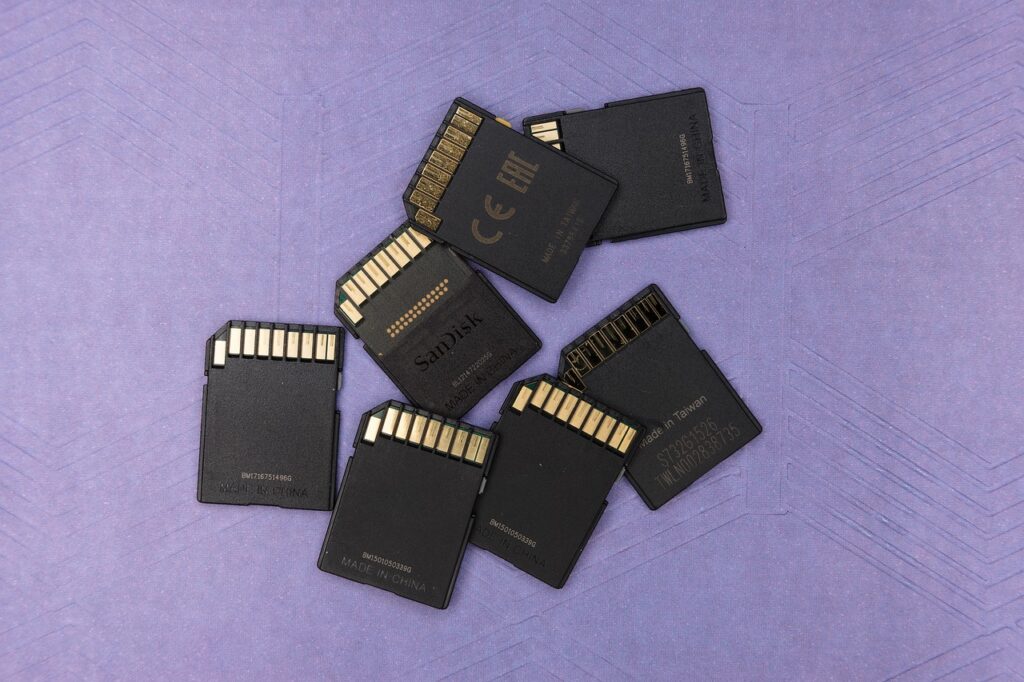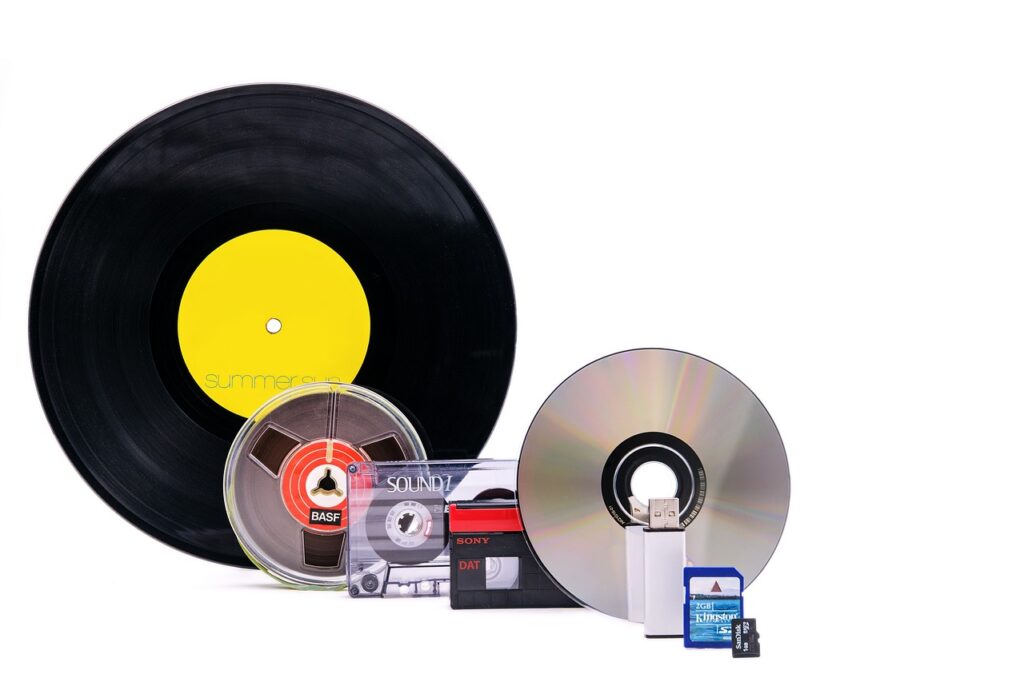DVDs vs Pen Drives vs SD Cards: Choosing the Best Storage Option for Your Needs

In today’s digital age, there are a variety of ways to store and transfer information, including DVDs, pen drives, and SD cards. Each of these storage options has its advantages and disadvantages, and understanding them can help you choose the best option for your specific needs.
Let’s start with understanding DVDs first:
DVDs:
DVDs are a popular storage option that has been around for many years. They are relatively inexpensive, widely available, and can hold a significant amount of data, up to 8.5 GB for a dual-layer DVD. DVDs are also easy to use; simply burn the data onto the disc, and it can be played on any DVD player or computer with a DVD drive.

One disadvantage of DVDs is their limited lifespan. The data on a DVD can degrade over time, and the disc itself can become damaged, making it unreadable. Additionally, DVDs are not as convenient to carry around as smaller storage devices like pen drives and SD cards.
Pen Drives:
Pen drives, also known as USB flash drives or thumb drives, are small, portable storage devices that can hold a large amount of data. They are convenient and easy to use; simply plug them into a USB port on a computer, and the data can be accessed quickly.

One of the biggest advantages of pen drives is their durability. They are less prone to damage than DVDs and can withstand more wear and tear. Additionally, pen drives are smaller and more convenient to carry around than DVDs.
However, one of the biggest disadvantages of pen drives is their limited lifespan. They can only handle a limited number of write and erase cycles before they begin to degrade, which can result in data loss. Additionally, pen drives can be lost or stolen, which can compromise the security of the data they contain.
SD Cards:
SD cards are small, portable storage devices that are commonly used in digital cameras and other portable devices. They come in a variety of sizes and can hold a significant amount of data, up to 1TB for the largest cards.

One advantage of SD cards is their size. They are small and lightweight, making them easy to carry around in a pocket or bag. Additionally, SD cards are more durable than DVDs and pen drives, with the ability to withstand shock and vibration without losing data.
However, one disadvantage of SD cards is their limited lifespan. Like pen drives, they can only handle a limited number of write and erase cycles before they begin to degrade. Additionally, SD cards can be more expensive than DVDs and pen drives, especially for larger capacities.
Let’s Compare DVDs, Pen Drives, and SD Cards Side By Side:
| Factor | DVD | Pen Drive | SD Card |
|---|---|---|---|
| Storage capacity | Up to 8.5 GB (dual-layer) | Up to 2 TB | Up to 1 TB |
| Durability | Prone to scratches and can degrade over time | More durable than DVDs, but can be damaged with excessive wear and tear | More durable than DVDs and pen drives, able to withstand shock and vibration |
| Convenience | Require a DVD drive to read and write data | Can be easily plugged into a USB port on a computer | Can be easily inserted into a device’s SD card slot |
| Lifespan | Limited lifespan, data can degrade over time | Limited lifespan, can only handle a certain number of write and erase cycles | Limited lifespan, can only handle a certain number of write and erase cycles |
| Portability | Less convenient to carry around compared to pen drives and SD cards | Small and portable, easy to carry around in a pocket or bag | Small and portable, easy to carry around in a pocket or bag |
| Security | Data can be protected with password protection or encryption, but DVDs can be easily copied | Data can be protected with password protection or encryption, but pen drives can be lost or stolen | Data can be protected with password protection or encryption, but SD cards can be lost or stolen |
When choosing between DVDs, pen drives, and SD cards, it’s essential to consider your specific needs. DVDs are inexpensive and easy to use, but they have a limited lifespan. Pen drives are more durable and portable, but they can also have a limited lifespan and be lost or stolen. SD cards are small and lightweight, but they can also be more expensive and have a limited lifespan.
Ultimately, the best storage option will depend on your specific needs and preferences.
What is Best for a Business? DVDs or Pen Drives or SD Cards?
When it comes to choosing a storage option for your business, it’s important to consider your specific needs and priorities. Each storage option – DVDs, pen drives, and SD cards – has its advantages and disadvantages.
For businesses that require a large amount of data storage, DVDs may not be the best option. While DVDs can hold up to 8.5 GB of data, they can be cumbersome to manage and store, especially when dealing with large volumes of data. Additionally, DVDs have a limited lifespan and can degrade over time, potentially resulting in data loss.
Pen drives are a more popular option for businesses that require portability and ease of use. They are small and lightweight, making them easy to carry around, and can be quickly accessed by plugging them into a USB port on a computer. However, pen drives also have a limited lifespan, and if they are lost or stolen, the data they contain could be compromised.
SD cards are another option for businesses that require portability and flexibility. They are small, lightweight, and can be used in a variety of devices, including cameras, smartphones, and tablets. Additionally, SD cards are more durable than DVDs and pen drives, able to withstand shock and vibration without losing data. However, like DVDs and pen drives, they also have a limited lifespan and can be lost or stolen.

Ultimately, the best storage option for your business will depend on your specific needs and priorities. If you require large volumes of data storage and don’t need portability, DVDs may be the best option. If you require portability and ease of use, pen drives may be the better choice. If you require both portability and flexibility, SD cards may be the way to go. Whichever option you choose, it’s important to back up your data regularly and take steps to protect it from loss or theft.
What We Recommend
When it comes to choosing a storage option, we recommend using pen drives and SD cards over DVDs. While DVDs can hold a considerable amount of data, they have a limited lifespan, can be easily scratched, and can degrade over time. Pen drives and SD cards, on the other hand, are more durable, portable, and can hold a comparable amount of data. They can be easily carried around, can be accessed quickly by plugging them into a USB port or SD card slot, and are less prone to damage.
Additionally, they can be used in a variety of devices, including cameras, smartphones, and tablets. Overall, choosing pen drives and SD cards over DVDs can provide greater convenience, portability, and reliability for your storage needs.
Final Verdict
When it comes to choosing a storage option, the decision ultimately rests with the user and their specific needs and priorities. DVDs, pen drives, and SD cards each have their advantages and disadvantages, and the choice of which to use depends on factors such as storage capacity, durability, convenience, lifespan, portability, and security. For businesses or individuals with a large amount of data to store, DVDs may be the best option. For those who require portability and ease of use, pen drives or SD cards may be the better choice. Ultimately, it’s important to assess your specific needs and priorities and choose a storage option that best meets those requirements. Whichever option you choose, it’s important to regularly back up your data and take steps to protect it from loss or theft.






